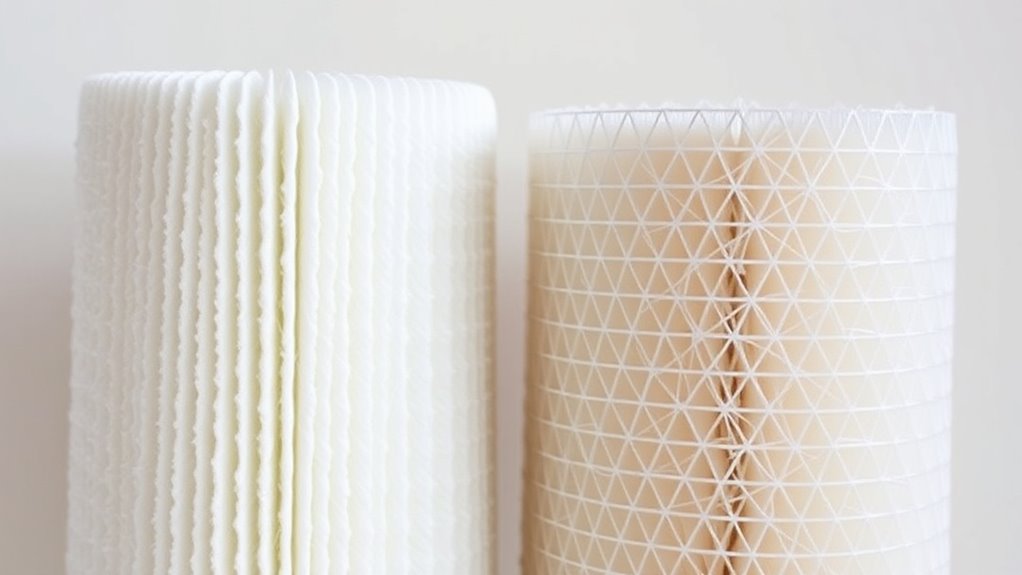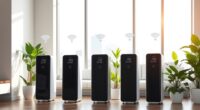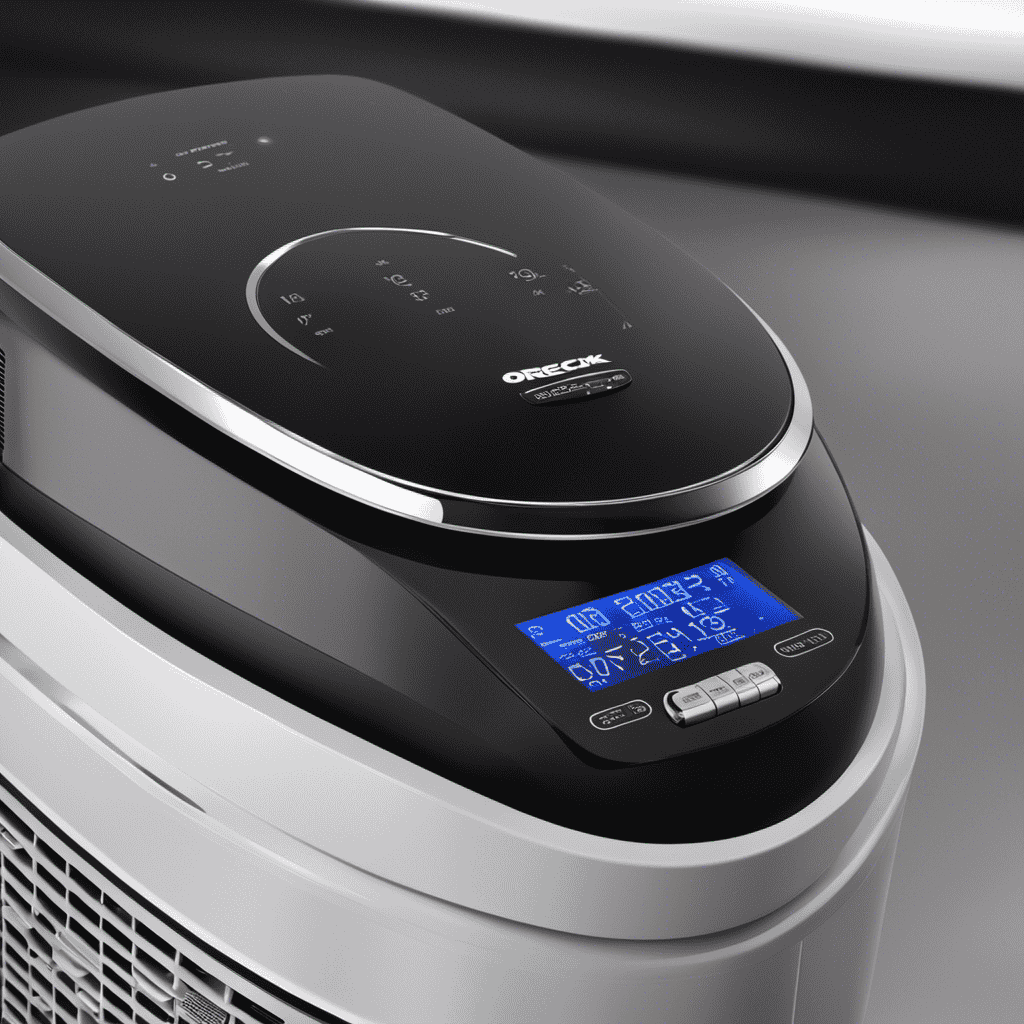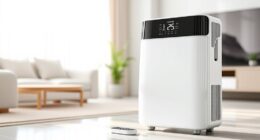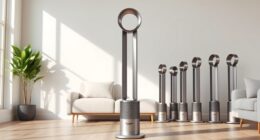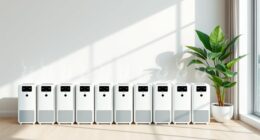True HEPA filters physically trap at least 99.97% of airborne particles as small as 0.3 microns with dense, layered fibers, offering high efficiency and durability. HEPA-type filters are less dense, rely more on surface filtering, and typically capture larger particles with lower overall efficiency. If you want to understand how these differences affect your air quality and which filter suits your needs best, keep exploring these details further.
Key Takeaways
- True HEPA filters physically trap ≥99.97% of 0.3-micron particles using densely packed fibers, while HEPA-type filters rely more on surface filtering.
- True HEPA filters are certified to meet strict standards, offering higher efficiency and longer lifespan; HEPA-type filters are less regulated.
- True HEPA filters are generally more expensive upfront but provide superior air purification, especially for tiny particles like allergens and bacteria.
- HEPA-type filters typically capture larger particles and have lower removal efficiency, requiring more frequent replacements.
- Proper airflow and regular maintenance are essential for both filter types to ensure optimal performance.
What Are True HEPA Filters?
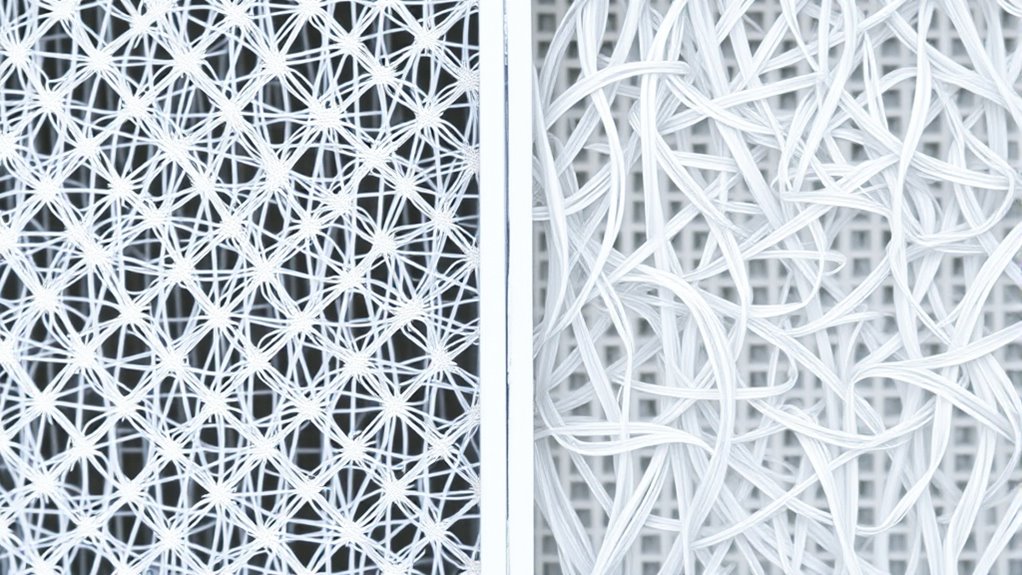
A True HEPA filter is a high-efficiency air filter designed to capture at least 99.97% of particles that are 0.3 microns in size. When choosing air purifier brands, look for models equipped with genuine HEPA filters to guarantee peak performance. These filters are made from densely packed fibers that trap tiny particles like dust, pollen, pet dander, and bacteria. Because of their high filtration efficiency, True HEPA filters often have a longer filter lifespan, but they still need regular replacement to maintain effectiveness. You’ll find that reputable air purifier brands emphasize the quality and durability of their filters, ensuring you get consistent air cleaning over time. Investing in a True HEPA filter means better air quality and reliable performance. Advanced filtration technology plays a crucial role in ensuring such high levels of particle removal, especially when combined with proper filter maintenance to sustain optimal performance. The use of HEPA standards helps define the reliability and effectiveness of these filters in improving indoor air quality. Additionally, understanding filter efficiency ratings can help consumers make informed decisions about their air purification needs. Regularly checking air quality indicators can help determine when to replace filters for continued effectiveness.
What Are HEPA-Type Filters?
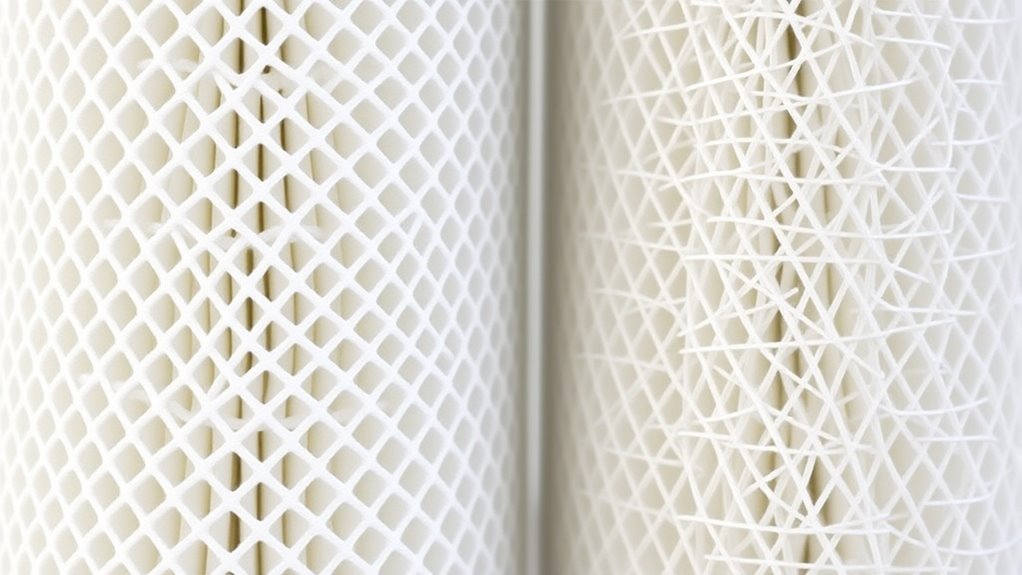
Have you wondered how HEPA-type filters compare to true HEPA filters? HEPA-type filters are designed to improve air quality at a lower cost, using a less dense filter material. They often capture larger particles like dust, pollen, and pet dander, but may not trap the tiniest pollutants as effectively. Because of their less dense construction, HEPA-type filters typically have a shorter filter lifespan, requiring more frequent replacements to maintain ideal air quality. These filters are a good choice if you’re looking for an affordable option for basic air purification, but they might not provide the same level of filtration as true HEPA. Keep in mind that their performance can vary, so check the specifications to ensure they meet your air quality needs. Additionally, understanding filter material helps consumers select the best option for their specific needs. Knowing the regional availability of filters can also influence your choice, especially if you need replacement filters quickly. Being aware of filter standards can help you determine the effectiveness of different filter types and ensure you’re getting a product suited to your air purification requirements. For example, certifications can serve as an important indicator of a filter’s quality and efficiency. Moreover, considering filter efficiency ratings can help you compare different products more accurately.
How Do True HEPA and HEPA-Type Filters Work?

True HEPA and HEPA-type filters trap particles through different mechanisms, affecting their overall effectiveness. Understanding how each filter captures contaminants helps you choose the right option for your needs. Let’s explore their filtration methods, strengths, and limitations. True HEPA filters use a dense mat of randomly arranged fibrous threads to physically capture at least 99.97% of particles as small as 0.3 microns, including dust, pollen, and bacteria. HEPA-type filters, on the other hand, typically utilize less dense fibers, relying more on mechanical filtration and often capturing a lower percentage of very small particles. Additionally, true HEPA filters are often certified to meet strict standards, ensuring consistent performance, while HEPA-type filters may vary in quality and effectiveness. The filtration efficiency of true HEPA filters is rigorously tested and certified, providing reliable protection in sensitive environments. Moreover, the manufacturing standards for true HEPA filters are highly regulated, which guarantees their performance consistency and durability over time. Furthermore, the material density in true HEPA filters contributes significantly to their superior particle retention capabilities.
Filtration Mechanisms Explained
Understanding how True HEPA and HEPA-Type filters work involves examining the mechanisms they use to trap particles. Both filters rely on three main processes: interception, impaction, and diffusion. Airflow dynamics play a vital role, as they direct air through the dense filter media, capturing particles as they collide with fibers. True HEPA filters use densely packed fibers to trap 99.97% of particles as small as 0.3 microns, maintaining a consistent filtration process. HEPA-Type filters, with less dense media, rely more on surface filtering and may have a shorter filter lifespan. Proper airflow guarantees maximum particle removal, but excessive resistance can reduce efficiency and shorten the filter’s durability. Understanding these mechanisms helps you choose a filter that balances performance and longevity.
Effectiveness and Limitations
While both True HEPA and HEPA-Type filters are designed to improve air quality and allergy relief, their effectiveness varies markedly. True HEPA filters can trap at least 99.97% of airborne particles as small as 0.3 microns, making them highly effective for sensitive individuals. In contrast, HEPA-Type filters may only meet lower efficiency standards, capturing fewer tiny particles. To understand their limitations:
- True HEPA filters offer superior allergy relief but can be more expensive and require regular maintenance.
- HEPA-Type filters are often less efficient, which can compromise air quality over time.
- Neither filter type removes gases or odors effectively, limiting overall air purification.
- It’s important to verify the filter’s certification and standards to ensure optimal performance. Additionally, understanding the filtering efficiency helps in selecting the right air purifier for your needs.
- Regular replacement of filters is essential to maintain their air purification capabilities, which can be affected by the filter’s lifespan and usage conditions, ensuring continued effectiveness. Moreover, selecting filters with appropriate filtration materials can further enhance air quality.
Filtration Efficiency and Performance Differences
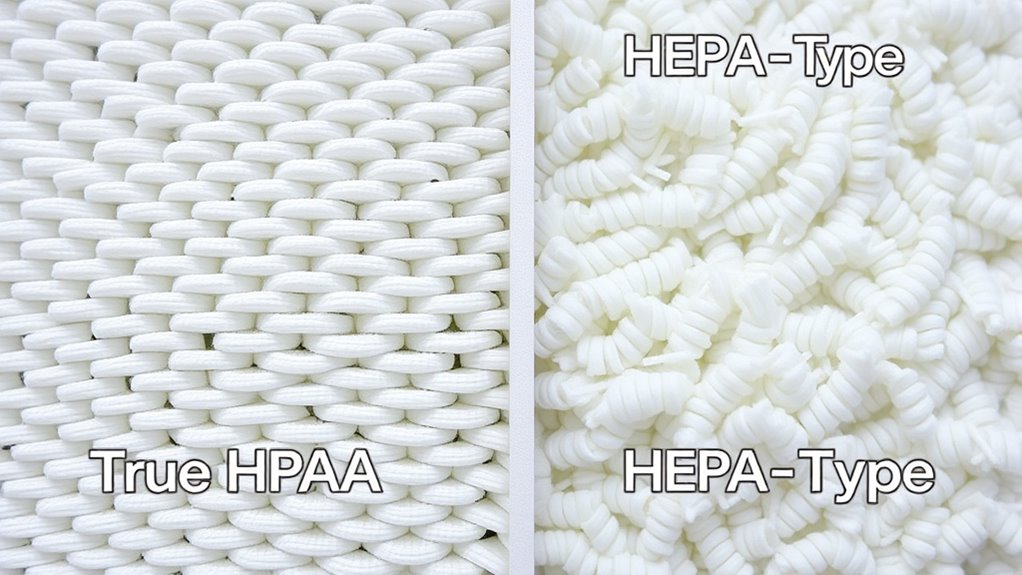
Have you ever wondered how well HEPA filters actually remove airborne particles? True HEPA filters are designed to capture at least 99.97% of particles as small as 0.3 microns, making them highly efficient. HEPA-type filters, on the other hand, often have lower removal rates, which can affect overall performance. The difference in filtration efficiency impacts airflow optimization; true HEPA filters maintain strong airflow without sacrificing filtration quality. This ensures your air purifier operates effectively over time, supporting a longer filter lifespan. HEPA filters are specifically tested and certified, providing consistent performance. In contrast, HEPA-type filters may vary in quality, offering less reliable filtration and potentially needing more frequent replacements. Understanding these differences helps you choose a filter that balances efficiency with durability. Additionally, lifestyle factors such as remote work environments and workspace organization can influence overall indoor air quality and filter effectiveness. Moreover, ongoing monitoring of AI behavior in filter manufacturing can help ensure quality standards are maintained for optimal performance. Incorporating advanced filtration technologies can further enhance air purification efficiency and longevity. For example, advancements in filter media can improve particle capture rates and extend service life. Regular maintenance and awareness of air quality indicators can also optimize your filtration system’s performance over time.
Construction and Material Composition
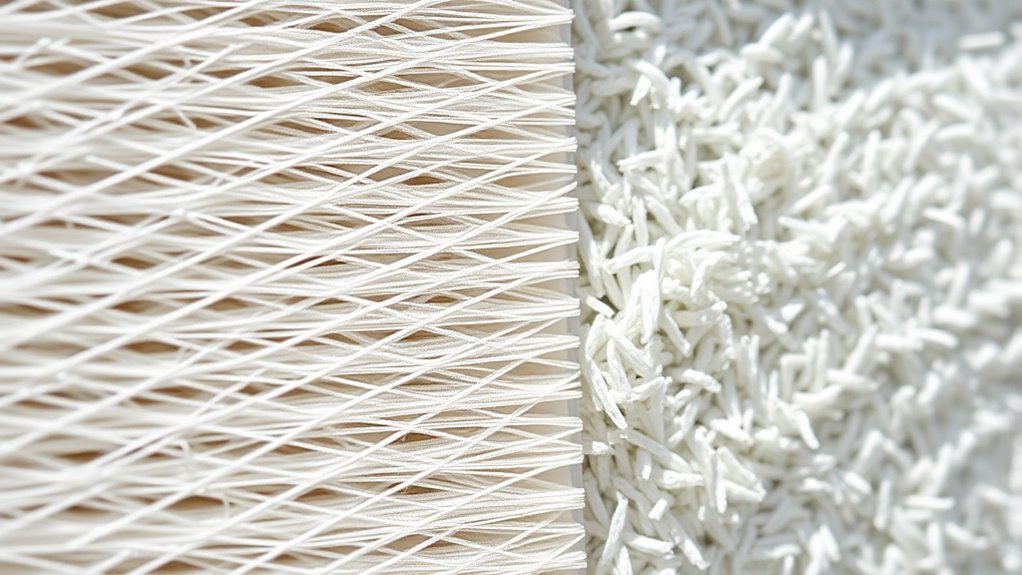
True HEPA filters are constructed from dense, layered fiberglass or synthetic fibers arranged in a tightly woven mat, designed to trap airborne particles effectively. Their material durability ensures they maintain filtration efficiency over time, even with regular use. Manufacturing processes involve precise layering and bonding techniques that create a sturdy, resilient filter. Here are key points to regard: construction quality is crucial for ensuring long-term effectiveness. Additionally, the filtering efficiency of True HEPA filters is tested and certified to remove at least 99.97% of particles that are 0.3 microns in diameter, emphasizing their high-performance standards. The material composition also contributes significantly to their ability to withstand continuous airflow without degradation. Proper maintenance is also essential for preserving filter performance and longevity.
Common Uses and Suitable Environments
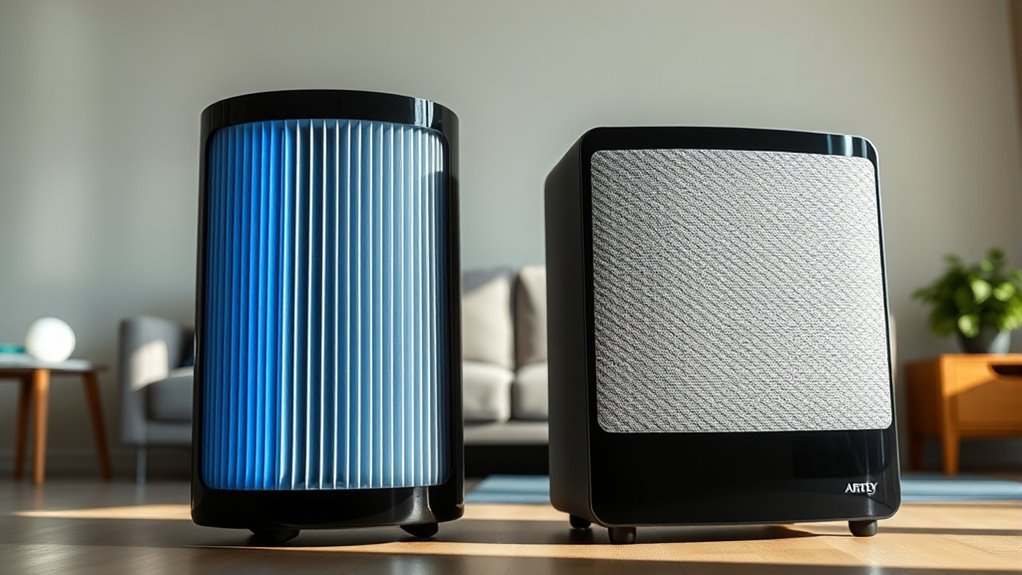
Due to their durable construction and high filtration efficiency, true HEPA filters are widely used in environments where clean air is critical. You’ll find them in air purifier applications designed for allergy sufferers, asthma patients, and hospitals, ensuring airborne particles are effectively removed. They are ideal for residential settings needing reliable filtration against dust, pet dander, and mold spores. In industrial settings, true HEPA filters are essential for maintaining air quality during manufacturing processes, especially where hazardous particles or contaminants are present. These filters also serve well in cleanrooms, laboratories, and pharmaceutical facilities. Their ability to trap tiny particles makes them suitable for environments demanding the highest air purity, providing peace of mind and protecting health in both home and industrial spaces. Additionally, their effectiveness is enhanced by high filtration efficiency, making them suitable for environments that require strict air quality standards.
Cost and Maintenance Considerations

When choosing between True HEPA and HEPA-Type filters, you’ll want to contemplate the initial purchase price and ongoing costs. True HEPA filters often cost more upfront but may save you money over time with lower replacement and maintenance expenses. Understanding these costs helps you make a smarter investment for your air quality needs.
Initial Purchase Price
The initial purchase price of HEPA filters varies considerably between true HEPA and HEPA-type options, impacting your budget from the start. True HEPA filters tend to cost more upfront but offer superior air quality and energy efficiency. Consider these points:
- True HEPA filters often cost 50-100% more initially, reflecting their higher filtration standards.
- HEPA-type filters are more affordable but may require more frequent replacements, affecting long-term costs.
- The choice influences your operating expenses, especially if energy efficiency is a priority for your setup.
While true HEPA filters have a higher initial price, they deliver better air quality and energy savings over time. Your decision should balance upfront costs with long-term performance and air quality needs.
Filter Replacement Costs
While true HEPA filters may cost more upfront, their replacement expenses can also influence your overall budget. Typically, these filters have a longer filter lifespan, meaning you won’t need to replace them as often. This lower replacement frequency can offset the higher initial investment, reducing ongoing costs. HEPA-Type filters, on the other hand, usually require more frequent replacements due to a shorter lifespan. Regularly replacing filters is essential to maintain air quality, but it can become costly over time if replacements happen often. Consider how often you’ll need to change each type and factor that into your long-term maintenance budget. Ultimately, understanding the balance between initial costs and replacement frequency helps you choose a filter that fits both your needs and your budget.
Long-term Maintenance Fees
Long-term maintenance fees for HEPA and HEPA-Type filters considerably impact your overall costs. These expenses depend largely on factors like air quality and filter lifespan. To keep costs manageable, consider:
- Regularly checking and replacing filters as needed to maintain ideal air quality.
- Investing in high-quality filters with longer lifespans, reducing frequent replacements.
- Considering the energy efficiency of your filtration system, which affects ongoing costs.
Choosing between true HEPA and HEPA-Type filters influences long-term expenses—true HEPA filters generally last longer but may be pricier upfront. Proper maintenance maximizes filter lifespan, ensuring consistent air quality and minimizing ongoing costs.
Certification and Standards for Filters

Certification and standards guarantee that filters meet specific performance criteria, giving you confidence in their ability to capture airborne particles. When evaluating filter options, look for recognized industry standards and filter certification labels. These certifications confirm the filter’s effectiveness and quality. For example, filters can be tested against industry benchmarks to ensure they meet minimum particle removal efficiencies. Here’s a quick comparison:
| Certification Type | What It Indicates |
|---|---|
| HEPA Certification | Meets strict particle removal standards |
| ULPA Certification | Removes even smaller particles |
| Industry Standards | Certification Authority |
| HEPA Standard | U.S. Department of Energy (DOE) |
| ULPA Standard | Underwriters Laboratories (UL) |
Choosing certified filters aligned with industry standards guarantees you’re getting reliable performance.
Choosing the Right Filter for Your Needs
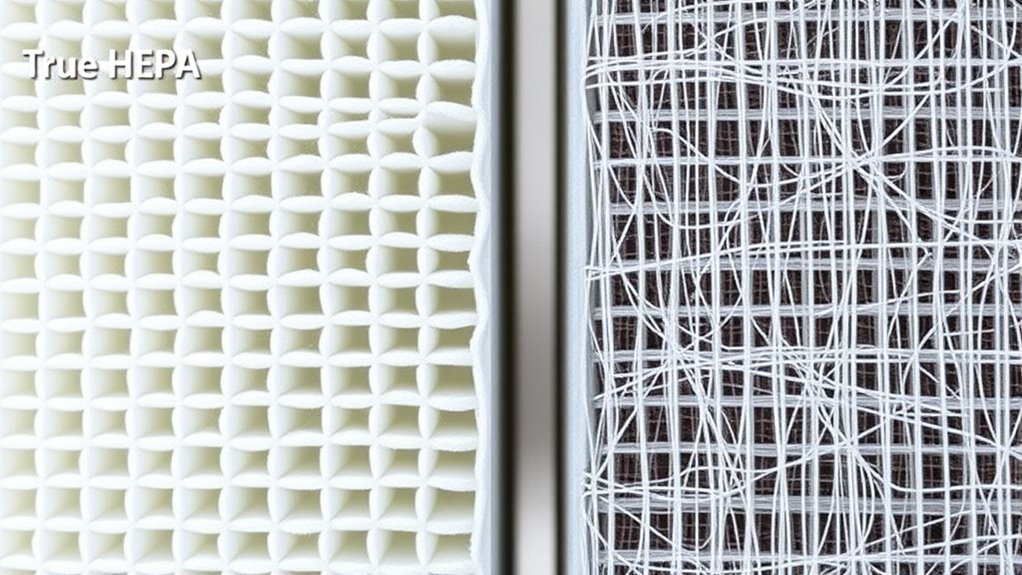
Choosing the right filter depends on understanding your specific air quality needs and the environment in which it will be used. If you’re focused on allergen removal or improving indoor air, consider these key factors:
- Air Quality Goals: Determine whether you need to eliminate dust, pet dander, or airborne bacteria.
- Filter Efficiency: For ideal allergen removal, true HEPA filters are more effective than HEPA-type options.
- Environment: Larger spaces or homes with allergy sufferers may benefit from higher-grade filters, while smaller rooms can use less robust options.
Frequently Asked Questions
Are HEPA Filters Effective Against Gases and Odors?
HEPA filters are great for trapping airborne particles, but they aren’t effective against gases and odors. If you want gas filtration or odor removal, look for filters with activated carbon or charcoal layers. These materials absorb gases and neutralize smells, complementing HEPA’s particle filtration. So, for all-encompassing air cleaning, consider a filter that combines HEPA with activated carbon to handle both particles and odors effectively.
How Long Do True HEPA and HEPA-Type Filters Typically Last?
Did you know that a typical HEPA filter lasts about 6 to 12 months? Your filter lifespan depends on usage, air quality, and maintenance. True HEPA filters generally need replacement every 12 months, while HEPA-type filters may last slightly longer or shorter based on their quality. Regularly checking and replacing your filters guarantees peak air purification and maintains indoor air quality.
Can HEPA-Type Filters Be Upgraded to True HEPA Filters Later?
You might wonder if you can do a filter upgrade from HEPA-type to true HEPA filters later. While some units are designed for compatibility, many aren’t, leading to potential compatibility issues. Before attempting an upgrade, check your device’s specifications and manufacturer’s advice. Sometimes, upgrading isn’t straightforward and could require replacing the entire unit to guarantee proper filtration and performance.
Do HEPA Filters Remove Viruses and Bacteria Effectively?
You’re wondering if HEPA filters effectively remove viruses and bacteria. They’re excellent for viral protection and bacterial elimination because they trap tiny particles as small as 0.3 microns, including many airborne pathogens. While no filter guarantees complete sterilization, HEPA filters considerably reduce airborne viruses and bacteria, helping improve indoor air quality and making your environment safer. Regular maintenance ensures these filters continue to provide the best viral protection.
Are There Environmental Impacts From Disposing of HEPA Filters?
You’ll want to weigh the waste worries when disposing of HEPA filters. Recycling challenges arise because filters often trap toxins, making them difficult to recycle safely. Improper disposal can create toxic waste, impacting the environment. You should consider carefully handling used filters, possibly seeking specialized disposal services, to minimize environmental impacts. Proper disposal reduces pollution, preventing harmful substances from polluting ecosystems and protecting public health.
Conclusion
Choosing between true HEPA and HEPA-type filters is like selecting a trustworthy guardian versus a hopeful protector. True HEPA filters stand as unwavering shields, capturing 99.97% of tiny particles, while HEPA-type filters are more like vigilant lookouts with varied performance. Your choice should reflect your environment’s needs—trust in the true guard for critical spaces, or opt for the adaptable protector when budget and convenience matter most. Ultimately, your filter is the gatekeeper of your clean air sanctuary.
